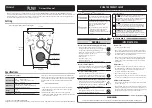
User’s Manual UTS1000B/T Series
Instruments.uni-trend.com
24 / 76
2. Press [Marker]> Marker
→
> Ref Lvl
Notice: Changing the reference level will change the amplitude value of the top grid line.
Measurement of Multiple Signal
This chapter will describe how to measure different kinds of multiple signal.
Use Difference Value
△
marker on the Same Screen to Compare Signal
With this spectrum analyzer, user can easily compare the signal differences between frequency and
amplitude. Difference value
△
marker function allows user to compare two signals on the same screen.
In this example, the harmonic components of the 10 MHz reference signal provided on the rear panel of
the spectrum analyzer are used to measure the difference in frequency and amplitude between the two
signals on the same screen. Difference value
△
marker is used to show the differences.
1. Reboot the spectrum analyzer;
Press [Default]> to reset
2. Connect 10MHz OUT port on the rear panel to RF IN port on the front panel
3. Set the center reference, span and reference level for check input signal and other harmonic wave
of 10MHz;
Press [FREQ]>Center Frequency>50MHz
Press [FREQ]>Span>100MHz
Press [AMPT]>Ref Level>20dBm
4. Place a marker at the maximum peak
(
10MHz
)
:
Press [Peak] next peak on the left and next peak on the right to move marker from peak to peak.
Marker should at 10MHz reference signal.
5. Lock a marker and activate the second marker:
Press [Marker]>Marker Mode>Delta
△
The marker with a label “× “which presents this is a reference signal.
6. Use rotary knob or [Peak] key to move marker 1
△
2 to other signal peak:
Press [Peak]> Next PK or
Press [Peak]>Next PK Left or Next PK Right
Or press [Marker]>Marker
△
Frequency>Rotate the Rotary Knob to Next PK
The difference of amplitude and frequency between the two markers are displayed on the
screen.
















































